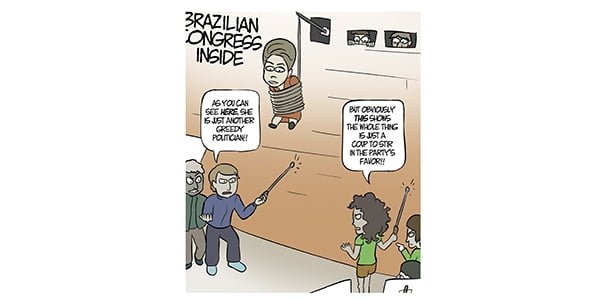On a typical Sunday afternoon, Brazilians from all over get together with family and close friends to watch the good old-fashioned sport of soccer for hours in front of the television.
This past Sunday, soccer was the last thing on Brazilians’ minds. April 17 marked the day the lower house of the National Congress, the Chamber of Deputies, voted to impeach Dilma Rousseff, Brazil’s current president.
Rousseff has been accused of using money from public banks to hide public deficits during one of the worst economic crises in Brazil’s history.
For over six hours, almost every television channel transmitted the voting live. The law requires that two-thirds of the 513 deputies in the lower house support the process of impeachment, which indeed happened.
Now, the process will go to the Senate, where it will also need the approval of two-thirds of senators to continue.
Rousseff’s supporters claim that the entire process is unconstitutional and will try to turn the tables. However, experts say that the situation goes beyond the constitution.
“From the juristic standpoint, there’s no one to analyze the voting because it was not technical but political,” said Erinaldo Dantas, lawyer and professor of tax law at Farias Brito College, to The Guilfordian. “And it’s clear that the government completely lost its rapport with the Chamber of Deputies.”
Some believe that the impeachment process is completely ungrounded.
“There is controversy concerning the characterization of the practices alleged against the President of the Republic as a crime of responsibility,” said Darci de Farias Cintra, constitutional law professor at Asces College, to The Guilfordian in an email interview. “It would be necessary to characterize the actions as willful nature to give rise to liability of the president.”
This is why Rousseff’s supporters are calling the voting and the process a coup.
“I can see their point because she hasn’t been convicted of a crime,” said Professor of Political Science Ken Gilmore. “What she did with the transferring of money from these private banks, … her only crime was that she only did it more than other people did in the past.
“It’s like Hillary Clinton and her emails. You can’t put Hillary on trial for her emails when everyone did it. But at some point, how much of this are you allowed to do?”
The Brazilian media has also been accused of manipulating information.
“Most of the communication vehicles in Brazil belong to politicians or to businessmen who are connected to a party,” said Brazilian journalist Risoni Santos to The Guilfordian. “But there isn’t much we can do about it. This is how things work.”
The impeachment process is something Brazilians are very familiar with. In 1992, President Fernando Collor resigned before impeachment proceedings were completed. He was also accused of corruption.
“It was a different process even though their strategies were the same,” said Dantas. “Rousseff’s party and its social movements are minority, but they are established in our society, unlike Collor’s.”
Many Brazilians are afraid of what might happen if Rousseff steps down from office. Assistant Professor of Political Science Robert Duncan believes the solution might be to start all over.
“I understand the vice president is just as corrupt as she is,” he said. “You may just want to dissolve and have another election.”
Others think that only a huge change in Brazil’s legal system will save the country’s future.
“(We need) political and party reforms that contribute to the fight against corruption in Brazil,” said Cintra. “But it seems that the legislature members aren’t willing to carry out this reform.”
Some, however, are optimists about what is to come.
“I got to witness Brazilian civic engagement, and the people of Brazil are really being vocal about how they want their government to be run and are demanding transparency,” said junior Elena Robles, a student who spent a semester abroad in the country.
At the end of the day, transparency may be the one puzzle piece missing.
“So it really goes down to, ‘What’s Rousseff’s motivation?’” said Duncan. “If she wants to better the lives of the Brazilians, then give her some slack. But if it’s simply just greed, then I would throw her butt out of office so fast that it’d make her head spin. But again, (we) don’t know.”














